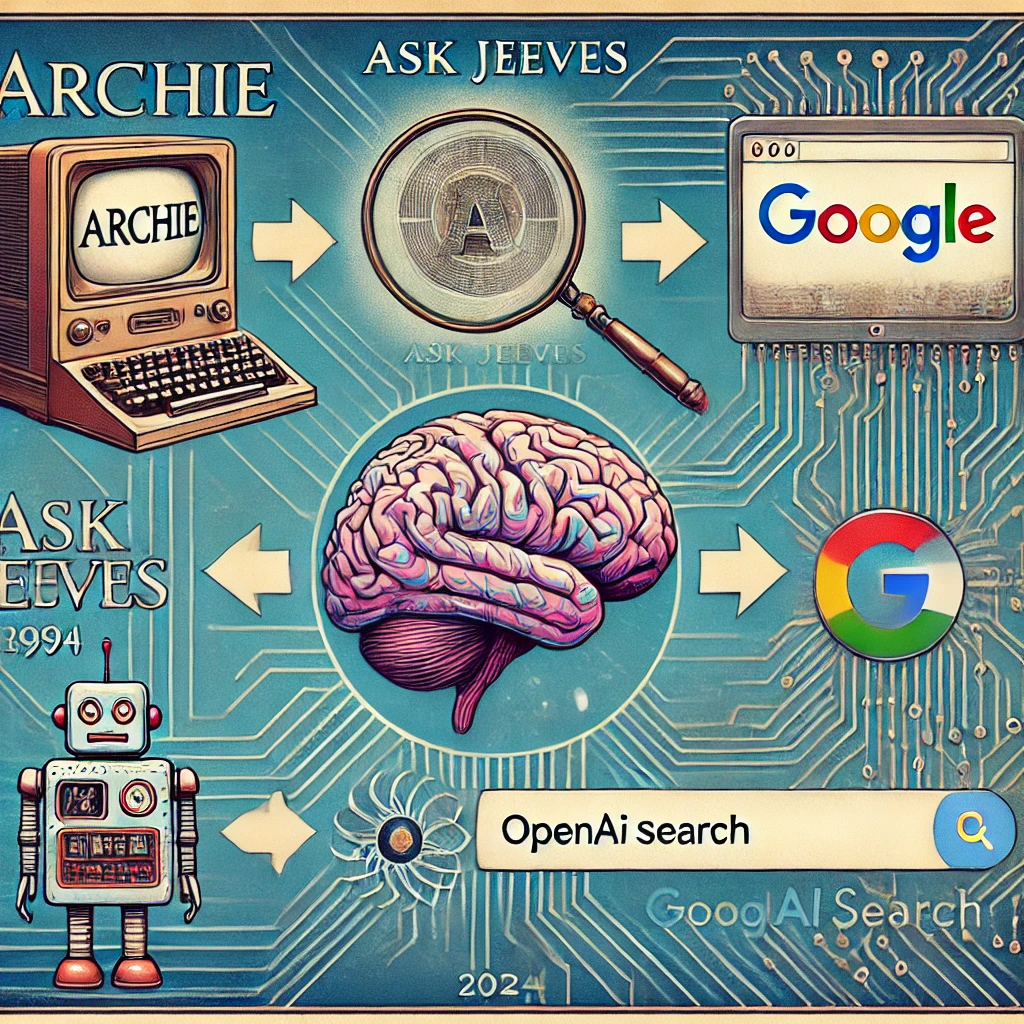The Evolution of Search Engines From Archie to OpenAI Search

The Evolution of Search Engines: From Archie to OpenAI Search
The story of search engines is a journey of constant innovation and transformation. It began in 1990 with Archie, a tool that allowed users to search filenames from FTP sites, laying the groundwork for indexing content online. Since then, search engines have evolved drastically, moving from simple keyword-based searches to AI-driven, context-aware experiences. Let’s explore this fascinating evolution and how it has shaped our interaction with the web.
1990: Archie - The First Step
In 1990, Archie became the first search engine, indexing filenames from FTP sites. Although rudimentary by today’s standards, Archie introduced the concept of indexing digital content, making it searchable. This marked the very beginning of our journey towards organizing the vast amount of information on the internet.
1991-1992: Gopher and Veronica - Organizing Content
The early ’90s brought Gopher, a protocol for organizing documents, and Veronica, a search tool for Gopher’s content. Together, they advanced the idea of searchable, organized web content, giving users more structure as they navigated the expanding web. It was the beginning of a more user-friendly approach to finding information.
1995: Altavista - Speed and Power
In 1995, Altavista set new standards for speed and search capabilities. It offered advanced search options and multilingual support, making it one of the first engines that truly focused on delivering fast and accurate results. Altavista was revolutionary, shaping the expectations of what a search engine could be.
1996: Ask Jeeves - Natural Language Queries
Ask Jeeves, launched in 1996, took a different approach by allowing users to input queries in natural language. It emphasized ease of use and intuitive question-answer interactions. Ask Jeeves introduced the idea that search engines should feel conversational and accessible, paving the way for the user-friendly interfaces we now take for granted.
1998: Google - The Game Changer
In 1998, Google changed everything. With its PageRank algorithm, which prioritized pages based on backlinks, Google transformed how we think about search relevance. The clean, minimalistic interface was a stark contrast to other search engines, and it quickly became the most popular choice for users. Google’s focus on delivering the most relevant results set a new benchmark for the industry.
2004: Yahoo Search - Attempting to Compete
By 2004, Yahoo had developed its own search engine after initially using Google for results. While Yahoo made attempts to compete with Google, it struggled to maintain user preference. Despite its efforts, Yahoo could not keep up with Google’s rapid growth and influence.
2009: Bing - User-Centric Features
Microsoft’s Bing, launched in 2009, offered a fresh perspective on search. Bing integrated features like cashback for shopping, visual search, and strong image integration, creating a more engaging user experience. It managed to carve out its own niche, focusing on visual appeal and user-centric functionalities.
2024: OpenAI Search (ChatGPT) - The AI Revolution
The latest milestone in search evolution is OpenAI Search, integrated with ChatGPT. Launched in 2024, this AI-driven search engine represents a significant shift towards real-time web search, conversational interaction, and source attribution. Unlike traditional search engines, OpenAI Search offers context-aware answers and an interactive, conversational experience. It’s not just about providing links anymore; it’s about understanding the intent behind a query and delivering a seamless, personalized information journey.
The Future of Search: An Interactive Experience
From Archie’s simple indexing to OpenAI Search’s sophisticated, conversational AI, search engines have continually evolved to better meet our needs. to better meet our needs. Today, with OpenAI Search, the user experience is no longer static; it’s an interactive, AI-driven journey that understands context and provides real-time insights. As we look ahead, it’s exciting to imagine where search will go next—continuing to transform, adapt, and redefine how we access information.
Let’s Stay Connected